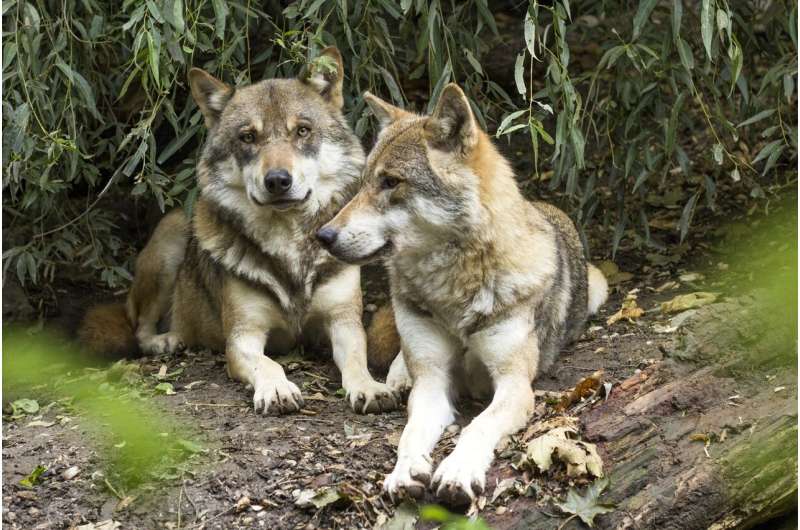This article has been reviewed according to Science X's editorial process and policies. Editors have highlighted the following attributes while ensuring the content's credibility:
fact-checked
trusted source
written by researcher(s)
proofread
Canadians have highly positive views of wolves, survey finds

Who is afraid of the big bad wolf? Turns out, fewer Canadians than you might think. But that was not always the case.
Aug. 13 marks International Wolf Day. But 100 years ago, it is hard to imagine there would have been any ability to even conceive of such a day, at least on the part of settlers. Celebrating wolves would have seemed ridiculous, even dangerous.
Wolves have historically been viewed with fear by most Canadians. So much so that provincial bounties were established to pay people to kill wolves, and many would not have thought twice about shooting a wolf if they had encountered one on their farm or in the wild.
This was in stark opposition to how many Indigenous nations thought and continue to think about wolves, as kin, brother and a hunter whose skill should be emulated.
So, how did Canadians go from shooting wolves to having a day that honors them? A lot has changed in the intervening years. But do people really want to celebrate wolves? Do they have positive feelings about them and think they deserve protection? That is what we were interested in finding out.
Canadians have generally positive attitudes toward wolves
In March 2023, partnering with conservation researcher Valli-Laurente Fraser-Celin and The Fur-Bearers, a Canadian charitable organization working to protect fur-bearing animals, we developed a survey that was administered by polling firm Research Co. and completed by 1,000 people. We asked Canadians about their knowledge of, and attitudes about, wolves and what circumstances might prompt them to act for their protection.
What we found is that most Canadians might find the idea of celebrating wolves quite appealing. Across Canada, 70 percent of survey participants had moderately or very positive attitudes toward wolves. Moreover, 77 percent considered them to be an iconic species and 83 percent thought of them as important ecosystem members.
Interestingly, these feelings are remarkably even across gender, income, party preference in the 2021 federal election, and province or territory of residence. It seems we are a country of wolf lovers.
This is perhaps unsurprising given that across Canada, wolves have remained abundant, occupying nearly 80 percent of their historic range. This differs from the United States where wolves were almost entirely eradicated.
Indeed, when Canadians celebrate International Wolf Day, we can proudly claim to be home to approximately 60,000 of the 200,000 to 250,000 gray wolves left in the world.
These positive feelings may also be influenced by the works of writers like Farley Mowat who encouraged readers in Never Cry Wolf to see wolves as noble, affectionate and playful individuals who live in families much like our own. And the audience for this view only grew when the novel was adapted into a film of the same name.
When we broke positive attitudes down by community type, the results were even more intriguing. Previous research and conventional wisdom suggests that rural dwellers do not like wolves. This would seem to make sense; rural people are more likely to be ranchers, farmers and hunters whose interactions with wolves can be negative.
However, we found that people in rural and remote communities had the most positive views at 74 percent, compared to 64 percent of suburban residents. It may be that familiarity with wolves has bred a degree of tolerance. In Canada, rural and remote dwellers are more likely to see or hear a wolf near their home and are 22 percent more willing to accept having wolves live within five kilometers of their home.
It seems that in Canada, wolves are more welcomed in the places they are also more likely to thrive: sparsely populated wild places.
Livestock loss remains a stumbling block
While people expressed fondness for wolves, they do not always like what they do. A clear majority of our survey respondents—60 percent—felt wolves were a primary threat to livestock.
Wolves do prey on livestock, and those losses are keenly felt, both economically and emotionally. But livestock are not under intense threat from wolves across Canada, even if there are some parts of the country, like Alberta, that experience higher rates of depredation.
Evidence shows that wolves will prey on livestock, especially if they are unprotected. Moreover, if wolves do not have wild prey to eat, they will turn to domesticated animals. Managing wolf predation is linked to making sure that other wild prey like moose, caribou and deer have space to flourish. In this way, wolf protection is tied to broader conservation aims that may also work to alleviate the livestock losses felt by ranchers and farmers.
Fostering wolf protection
Our survey also asked participants what would motivate them to act to protect wolves. Put differently, how can we mobilize affection for wolves?
Forty-two percent of people surveyed reported that they would act if wolf populations decreased. Forty-one percent reported they would act if they learned more about the ecosystem benefits that wolves provide, while a further 41 percent said they would act if they learned that a wolf had been killed illegally. Thirty-three percent reported that they would act if they saw a news report that wolf habitats were threatened.
These answers point to a desire for the preservation of wolf habitats and populations, so they can continue their role as keystone predators. This requires ongoing dialog and a focus on broader conservation efforts to make sure that next year on International Wolf Day, they continue to thrive.
Provided by The Conversation
This article is republished from The Conversation under a Creative Commons license. Read the original article.![]()




















